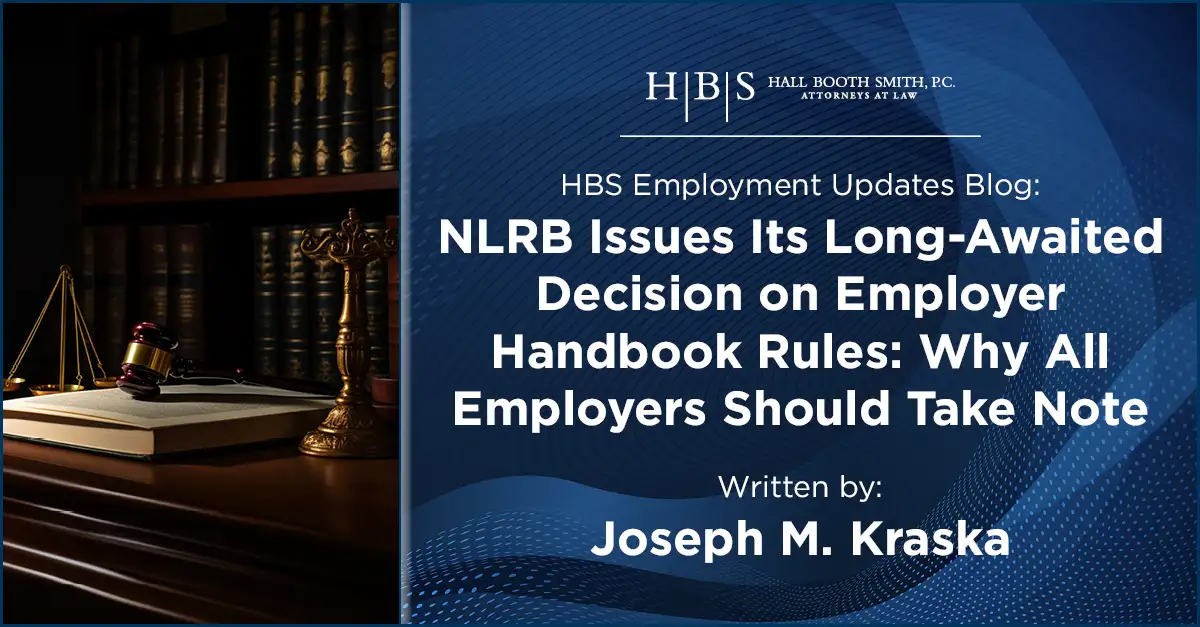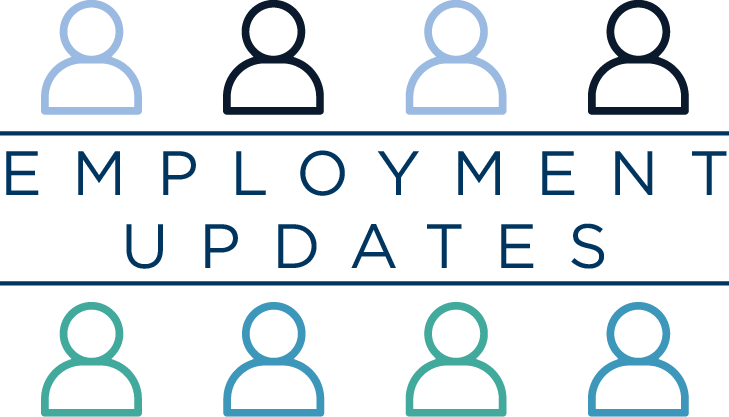
NLRB Issues Its Long-Awaited Decision on Employer Handbook Rules: Why All Employers Should Take Note
Introduction
On August 2, 2023, the National Labor Relations Board (NLRB) finally issued its long-awaited, watershed decision in Stericycle, Inc., 372 NLRB No. 113, which has nationwide impact on employers of all sizes and industries, whether unionized or not.
Under the Board’s new standard, when employers seek to implement specific work rules or policies, the Board will require employers to undertake a process of narrowly tailoring policies so that an “employee could [not] reasonably interpret the rule to have a coercive meaning.” The Board made clear that allegedly “overbroad” policies will be found unlawful even where the employer has not enforced them, and “even if a contrary, noncoercive interpretation of the rule is also reasonable.”
And if that wasn’t enough, the new standard will also be applied retroactively. The effect of this decision on employer’s work rules and policies cannot be understated.
Previous Standards
Prior to its decision in Stericycle, the NLRB’s precedent with respect to evaluating employer workplace rules and policies used a categorical approach where the Board evaluated facially neutral work rules to determine the nature and extent of their potential to impact Section 7 rights (e.g., to discuss the terms, conditions, and privileges of employment for purposes of mutual aid and protection), and the legitimate business justification associated with the policies at issue.
Category 1 work rules were always deemed lawful because they either did not interfere with Section 7 rights or otherwise were supported by ample business justification. For instance, policies prohibiting drug use at work typically do not raise Section 7 concerns.
Rules classified under Category 2 would be considered lawful in certain circumstances, but they would be subject to additional scrutiny. For instance, a policy prohibiting audio or video recording in the workplace might be unlawful in some industries but lawful in others, as in a HIPAA-secured environment.
Finally, rules classified under Category 3 would always be considered unlawful and could never be justified by an employer. An example of these policies would include prohibitions against sharing personal compensation information with a co-worker.
The Board’s prior standard at least supplied clarity and certainty for employers so they could draft work rules in a good faith attempt to comply with Section 7 without fear of arbitrary enforcement action by the NLRB.
New Standards
Under the new Stericycle decision, the Board adopted a modified Lutheran Heritage standard. In Lutheran Heritage, 343 NLRB 646 (2004), the Board ignored the employer’s justification and only considered whether a reasonable employee would construe a work rule to prohibit or chill the exercise of Section 7 rights.
This standard caused confusion among employers as they were essentially forced to guess how a “reasonable employee” would construe a work rule on a case-by-case basis with little or no consideration of their own business justification concerning the rule. Even more troublesome was the Board’s view that the reasonable employee’s interpretation of the rule would be controlling interpretation even if it was not the only or even most reasonable interpretation of the rule.
In Stericycle, the Board observed that “the Lutheran Heritage majority did not clearly explain how employer interests factored into the analysis [of facial neutral employer work rules].”
Potential Concerns
Despite recognizing Lutheran Heritage’s obvious flaws, the Board doubled-down on its archaic standard, holding that “the employer’s intent in maintaining a rule is immaterial.”
Instead, the Board’s evaluation of a work rule will only consider “the perspective of an employee who is subject to the rule and economically dependent on the employer, and who also contemplates engaging in protected concerted activity.” Accordingly, “if an employee could reasonably interpret the rule to have a coercive meaning…even if a contrary, noncoercive interpretation of the rule is also reasonable,” the Board will presume that the policy is unlawful. The employer would then have the opportunity to rebut the presumption “by proving that the rule advances a legitimate and substantial business interest and that the employer is unable to advance that interest with a more narrowly tailored rule.”
The narrowly tailored rule, as written, will have to be the only possible way to accomplish the employer’s legitimate and substantial business interests the rule was meant to advance.
Unsurprisingly, the Board acknowledged that its new standard is entirely unworkable in providing clear, cogent direction to employers: “[g]iven the wide range of work rules, the varying language they use, and the many different employment contexts in which they arise, we do not expect our new standard to provide complete certainty and predictability in this area of the law.”
In other words, the Board expects that, under a case-by-case approach, one set of work rules may be lawful for one employer but unlawful for others, even within the same industry.
Looking Forward
Employers everywhere must begin the work to comply with Stericycle. Working with experienced labor and employment counsel, employers should begin evaluating their work rules and organizing them into Stericycle categories.
Each Category 2 or 3 policy, such as restrictions on loitering, video or audio recordings, talking to third parties, confidentiality, and workplace civility rules, among others, will require at least two actions.
First, employers should attempt to narrow their policies to avoid any potential argument, from a reasonable employee’s perspective, that a work rule has a chilling effect on Section 7 rights. Second, for all narrowed and extant policies, the employer should prepare an accompanying internal memorandum that explains the employer’s justification for the rule and the unavailability of a narrower set of restrictions.
If you would like more information about how your business can stay ahead of the competition by maintaining compliance the NLRB’s new standard, please contact Joseph Kraska, Abtin Mehdizadegan, or any member of Hall Booth Smith’s Labor & Employment practice.
Disclaimer
This material is provided for informational purposes only. It is not intended to constitute legal advice nor does it create a client-lawyer relationship between Hall Booth Smith, P.C. and any recipient. Recipients should consult with counsel before taking any actions based on the information contained within this material. This material may be considered attorney advertising in some jurisdictions. Prior results do not guarantee a similar outcome.
Blog Overview
About the Author
Little Rock Associate Joseph M. Kraska specializes in labor and employment matters. He has represented clients in collective bargaining, RC petitions, unfair labor practice charges, labor arbitrations, OSHA compliance matters, and federal and state employment discrimination matters, and he provided general employment advice.



Leave a comment
You must be logged in to post a comment.